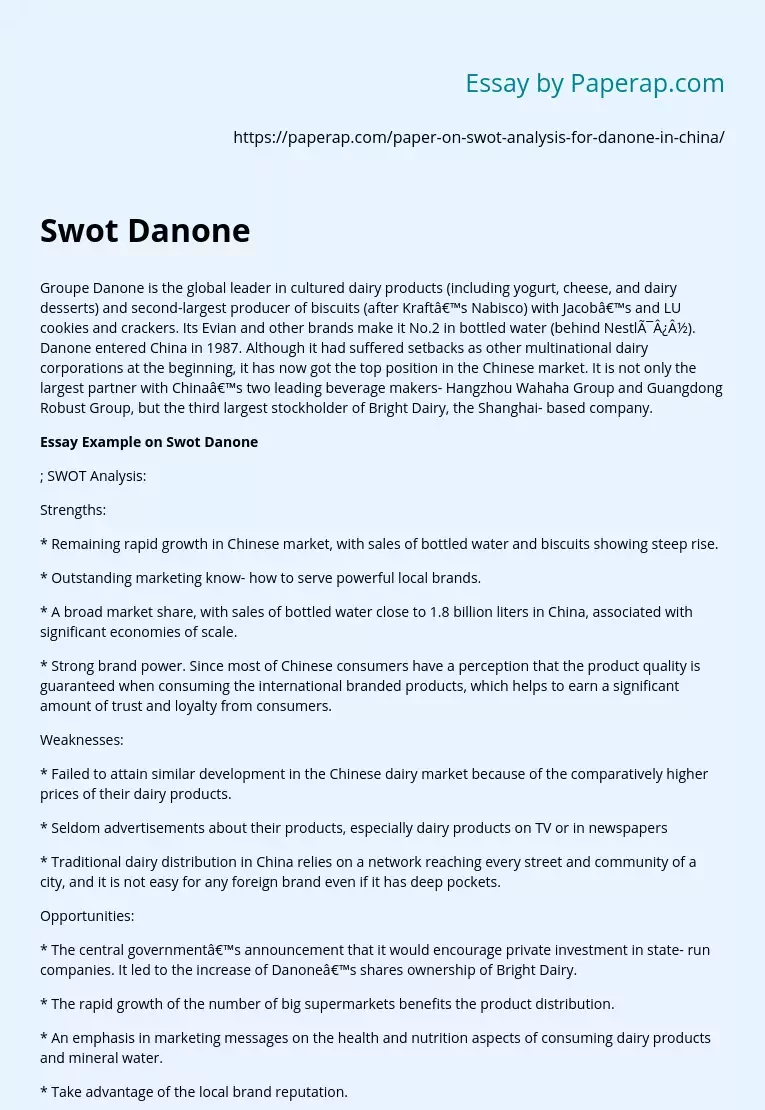Groupe Danone is the global leader in cultured dairy products (including yogurt, cheese, and dairy desserts) and second-largest producer of biscuits (after Kraft’s Nabisco) with Jacob’s and LU cookies and crackers. Its Evian and other brands make it No.2 in bottled water (behind Nestl�). Danone entered China in 1987. Although it had suffered setbacks as other multinational dairy corporations at the beginning, it has now got the top position in the Chinese market. It is not only the largest partner with China’s two leading beverage makers- Hangzhou Wahaha Group and Guangdong Robust Group, but the third largest stockholder of Bright Dairy, the Shanghai- based company.
SWOT Analysis:
Strengths:
* Remaining rapid growth in Chinese market, with sales of bottled water and biscuits showing steep rise.
* Outstanding marketing know- how to serve powerful local brands.
* A broad market share, with sales of bottled water close to 1.8 billion liters in China, associated with significant economies of scale.
* Strong brand power. Since most of Chinese consumers have a perception that the product quality is guaranteed when consuming the international branded products, which helps to earn a significant amount of trust and loyalty from consumers.
Weaknesses:
* Failed to attain similar development in the Chinese dairy market because of the comparatively higher prices of their dairy products.
* Seldom advertisements about their products, especially dairy products on TV or in newspapers
* Traditional dairy distribution in China relies on a network reaching every street and community of a city, and it is not easy for any foreign brand even if it has deep pockets.
Opportunities:
* The central government’s announcement that it would encourage private investment in state- run companies. It led to the increase of Danone’s shares ownership of Bright Dairy.
* The rapid growth of the number of big supermarkets benefits the product distribution.
* An emphasis in marketing messages on the health and nutrition aspects of consuming dairy products and mineral water.
* Take advantage of the local brand reputation.
Threats:
* Strong multinational competitors, such as Nestle and Parmalat.
* Pressure come from local brands that are much more familiar with the consuming habits of Chinese urban residents.
* The product characteristic (dairy products) makes it not easy to store and only can be available in big supermarkets.
; Further discussion:
“Our strategy is built on high profile brands for general public, backed by extensive advertising stressing nutritional benefits. At the same time, we aim to build new value into ranges over the medium term.”
— Simon Israel, Senior Vice-president
After learning the case of Danone Group, I would like to say that its present success mainly comes from its adjustment of strategy in China. When Danone entered China in the late 1980s, it adopted an organic growth strategy for its yogurt business because of seeing the emerging market opportunities and a lack of dominant brands. However, during the 1990s, the local players began to take the lead, Danone withdrew from the dairy market by selling factories to local companies and switched its strategy to mergers and acquisitions in China. The MNC aggressively acquired some of the smaller players at that time. On the other hand, Danone promoted its own label at the beginning, when foreign goods were regarded as high quality ones. But when the local companies established their own strong brands, Danone set off acquiring the local competitors and maintaining their local brands. Therefore, Danone’s outstanding marketing know- how to serve powerful local brands is one of its critical success factors.
SWOT Analysis for Danone in China. (2019, Nov 27). Retrieved from https://paperap.com/paper-on-swot-analysis-for-danone-in-china/

